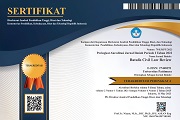Penerapan Prinsip Character Dalam Pelaksanaan Prinsip Kehati-hatian pada Analisis Pemberian Kredit Usaha Mikro
 ), Qoriatur Risma(2)
), Qoriatur Risma(2)
(1) Fakultas Hukum Universitas Jember, Jember, Indonesia
(2) Fakultas Hukum Universitas Jember, Jember, Indonesia
 Corresponding Author
Corresponding Author
Abstract
Keywords
DOI
10.47268/ballrev.v1i1.420
Published
2020-10-30
How To Cite
@article{BALLREV420,
author = {Rahmadi Tektona and Qoriatur Risma},
title = {Penerapan Prinsip Character Dalam Pelaksanaan Prinsip Kehati-hatian pada Analisis Pemberian Kredit Usaha Mikro},
journal = {Batulis Civil Law Review},
volume = {1},
number = {1},
year = {2020},
keywords = {Factors; Character; Credit},
abstract = {Credit is the ability to carry out a purchase or make a loan with a promise that payment will be deferred at an agreed time period. One financial institution that can provide credit is the bank, when providing credit the bank not only uses its own capital but also uses the customer's funds that have been entrusted to the bank. When providing credit, the bank cannot avoid the risk of non-performing loans, related to this, the bank applies the precautionary principle that is realized by the existence of the 5C principle, one of which is character. The application of the character principle aims to assess the character or character of the prospective debtor, whether the prospective debtor has a good character or is not good. The purpose of this paper is to analyze the factors driving and inhibiting the implementation of character principles in the analysis of micro business credit as a form of implementing prudential principles at Bank Mandiri Jember Branch. The type of research used by the author is Empirical Juridical. Then the method used is a qualitative approach method. The results of this research are the driving factors consisting of several factors, among others, in order to make credit activities run safely, minimize losses, ensure the smooth delivery of credit facilities, and build cooperation and trust between banks and customers for a long period of time. Related to the inhibiting factors consist of non-cooperative customers, bad faith in bank management, human resources, and proximity.},
issn = {2746-8151}, pages = {1--13} doi = {10.47268/ballrev.v1i1.420},
url = {https://fhukum.unpatti.ac.id/jurnal/ballrev/article/view/420}
}
Jurnal
Sari, G. N. (2013). Faktor-faktor yang Mempengaruhi Penyaluran Kredit Bank Umum di Indonesia (Periode 2008.1-2012.2). Jurnal EMBA, 1(3), 931-941.
Syafik, Mohammad & Murni, T. S. (2019). Analisis Penerapan Prinsip 7C Dalam Meminimalisi Resiko Pembiayan Pada PT. BPR Rukun Karya Sari Kedungpiring. Jurnal Ilmiah Akuntansi Peradaban, 5(2), 259-278. https://doi.org/10.24252/jiap.v5i2.11888
Wardani, P. D. K., Rudy, D. Gde., Wiryawan, I. W. (2013). Implementasi Prinsip Kehati-hatian Dalam Pemberian Kredit Pada PT BPR Sinar Putera Mas. Kertha Semaya, 1(8), 1-13. https://ojs.unud.ac.id/index.php/kerthasemaya/article/view/42079
Wilardjo, S. B. (2014). Pengertian, Peranan dan Perkembangan Bank Syari'ah di Indonesia. Value Added, 2(1), 1-10.
Buku
Abdullah, Thamrin & Tantri, F. (2012). Bank dan Lembaga Keuangan. Jakarta: Raja Grafindo Persada.
Djumhana, M. (1993). Hukum Perbankan Indonesia. Bandung: Citra Aditya Bakti.
Hasibuan, M. S. P. (2009). Dasar-Dasar Perbankan. Jakarta: Sinar Grafika Offset.
Jusuf, J. (1995). Analisis Kredit Untuk Account Officer. Jakarta: Gramedia Pustaka Utama.
Kamsir. (1997). Bank dan Lembaga Keuangan lainnya. Jakarta: Raja Grafindo Persada.
Mgs. The'Aman, E. P. (1989). Kredi Perbankan Suatu Tujuan Yuridis. Yogyakarta: Liberty.
Simorangkir, O. P. (1989). Kamus Perbankan. Jakarta: Bina Aksara.
Supramono, G. (1996). Perbankan dan Masalah Kredit. Jakarta: Djambatan.
Suyatno, T. (1990). Dasar-Dasar Perkreditan. Jakarta: Gramedia Pustaka Utama.
Usman, R. (2012). Aspek Hukum Perbankan Syariah di Indonesia. Jakarta: Sinar Grafika.
Yuspin, W. (2016). Aspek Hukum dan Kelembagaan Perbankan Syariah. Yogyakarta: Genta Publishing.
Skripsi, Tesis
Anjani, S. (2018). Penerapan Prinsip 5C Dalam Pemberian Kredit Sebagai Pencegahan Kredit Bermasalah. Skripsi, Universitas Sumatera Utara.
Guntara, A. (2017). Pnerapan Prinsip 5C Sebagai Upaya Perlindungan Terhadap Bank Dalam Menyalurkan Kredit. Skripsi, Universitas Udayana.
Pratama, B. A. (2010). Analisis Faktor-Faktor Yang Mempengaruhi Kebijakan Penyaluran Kredit Perbankan. Tesis, Universitas Diponegoro.
Siregar, E. N. (2018). Analisa Penerapan Prinsip 5C (Character, Capacity, Collateral, Capital, Condition Of Economy) Pada PT. Bank Sumut KCP USU. Skripsi, Universitas Sumatera Utara.
Wahyuni, N. (2018). Penerapan Prinsip 5C Dalam pemberian Kredit Sebagai Perlindungan Bank. Skripsi, Universitas Kediri. https://doi.org/10.25139/lex.v1i1.236
Yunita, N. P. (2019). Perlindungan Hukum Nasabah Beritikad Baik Terhadap Proses Lelang Jaminan Hak Milik Atas Tanah Dalam Perjanjian Kredit (Tinjauan Yuridis Terhadap Putusan Mahkamah Agung Republik Indonesia Nomor 283 K/Pdt.Sus-BPSK/2018). Skripsi, Universitas Jember.
| Dublin Core | PKP Metadata Items | Metadata for this Document | |
| 1. | Title | Title of document | Penerapan Prinsip Character Dalam Pelaksanaan Prinsip Kehati-hatian pada Analisis Pemberian Kredit Usaha Mikro |
| 2. | Creator | Author's name, affiliation, country | Rahmadi Indra Tektona; Fakultas Hukum Universitas Jember, Jember; Indonesia |
| 2. | Creator | Author's name, affiliation, country | Qoriatur Risma; Fakultas Hukum Universitas Jember, Jember; Indonesia |
| 3. | Subject | Discipline(s) | |
| 3. | Subject | Keyword(s) | Factors; Character; Credit |
| 4. | Description | Abstract | Credit is the ability to carry out a purchase or make a loan with a promise that payment will be deferred at an agreed time period. One financial institution that can provide credit is the bank, when providing credit the bank not only uses its own capital but also uses the customer's funds that have been entrusted to the bank. When providing credit, the bank cannot avoid the risk of non-performing loans, related to this, the bank applies the precautionary principle that is realized by the existence of the 5C principle, one of which is character. The application of the character principle aims to assess the character or character of the prospective debtor, whether the prospective debtor has a good character or is not good. The purpose of this paper is to analyze the factors driving and inhibiting the implementation of character principles in the analysis of micro business credit as a form of implementing prudential principles at Bank Mandiri Jember Branch. The type of research used by the author is Empirical Juridical. Then the method used is a qualitative approach method. The results of this research are the driving factors consisting of several factors, among others, in order to make credit activities run safely, minimize losses, ensure the smooth delivery of credit facilities, and build cooperation and trust between banks and customers for a long period of time. Related to the inhibiting factors consist of non-cooperative customers, bad faith in bank management, human resources, and proximity. |
| 5. | Publisher | Organizing agency, location | Faculty of Law, Universitas Pattimura |
| 6. | Contributor | Sponsor(s) | |
| 7. | Date | (YYYY-MM-DD) | 2020-10-30 |
| 8. | Type | Status & genre | Peer-reviewed Article |
| 8. | Type | Type | |
| 9. | Format | File format | |
| 10. | Identifier | Uniform Resource Identifier | https://fhukum.unpatti.ac.id/jurnal/ballrev/article/view/420 |
| 10. | Identifier | Digital Object Identifier | 10.47268/ballrev.v1i1.420 |
| 11. | Source | Title; vol., no. (year) | Batulis Civil Law Review; Vol 1, No 1 (2020): VOLUME 1 NOMOR 1, NOVEMBER 2020 |
| 12. | Language | English=en | en |
| 13. | Relation | Supp. Files | |
| 14. | Coverage | Geo-spatial location, chronological period, research sample (gender, age, etc.) | |
| 15. | Rights | Copyright and permissions | Copyright: Authors who publish their manuscripts in this Journal agree to the following conditions: 1. The copyright in each article belongs to the author, as well as the right to patent. 2. Authors are able to enter into separate, additional contractual arrangements for the non-exclusive distribution of the journal's published version of the work (e.g., post it to an institutional repository or publish it in a book), with an acknowledgment of its initial publication in this journal. 3. Authors are permitted and encouraged to post their work online (e.g., in institutional repositories or on their website) prior to and during the submission process, as it can lead to productive exchanges, as well as earlier and greater citation of published work. 4. Authors have the right to self-archiving of the article (Author Self-Archiving Policy)
Licence : Batulis Civil Law Review Journal is disseminated based on the Creative Commons Attribution-NonCommercial 4.0 International license terms. This license allows anyone to copy and redistribute this material in any form or format, compose, modify, and make derivatives of this material for any purpose. You cannot use this material for commercial purposes. You must specify an appropriate name, include a link to the license, and certify that any changes have been made. You can do this in a way that is appropriate, but does not imply that the licensor supports you or your use.
|
Copyright (c) 2020 Rahmadi Indra Tektona, Qoriatur Risma

This work is licensed under a Creative Commons Attribution-NonCommercial 4.0 International License.

 : 6314 times
: 6314 times Download : 4028 times
Download : 4028 times














